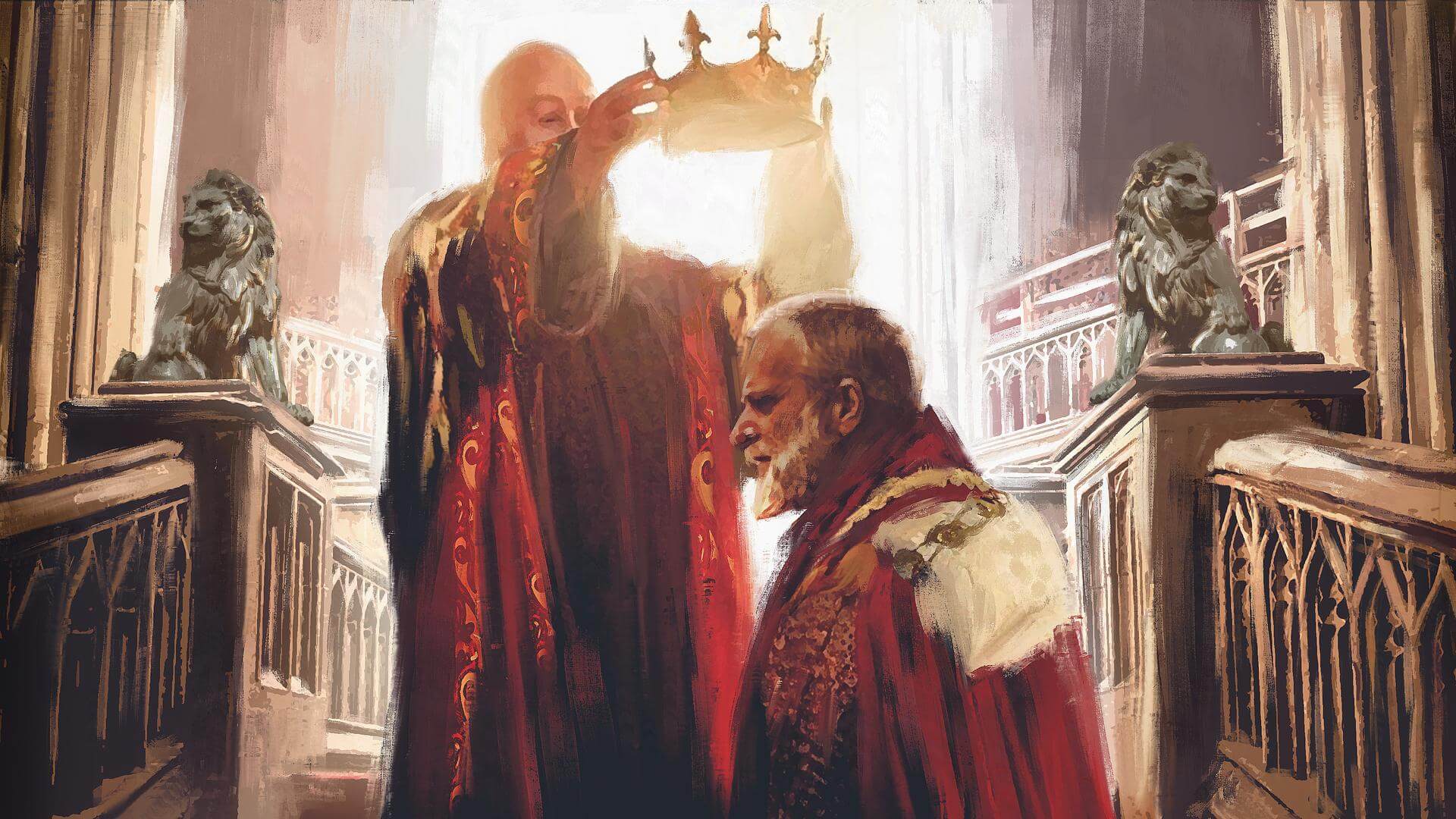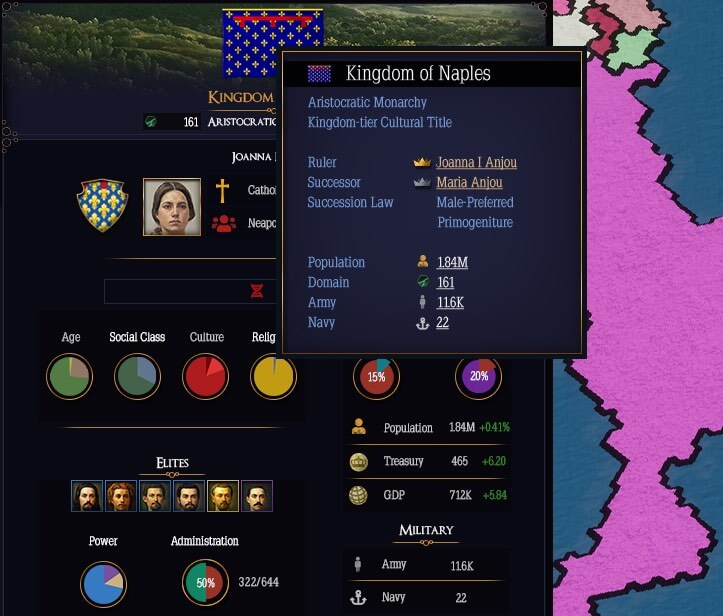Dev Diary #11: Titles
17:18, 18 Jun 2022

Hello and welcome to the 11th development diary of Grey Eminence!
Today’s topic is titles, one of the defining features of every country. Titles contain a lot of important information about a country, like its name, map color, rank, type and flag. More importantly, titles are also the key component in reforming existing countries or creating new ones (though we’ll get to that in a bit). Increasing the rank of your country or claiming a more powerful title is one of the most visible manifestations of progression in Grey Eminence, so knowing how titles work is important to success.
Name
The most basic feature of every title is its name, which is the collection of noun, adjective, prefix/suffix that combines with the country’s rank to form its full designation. By default, titles use whichever designation structure matches most closely to the way those countries are referred to popularly. However, you can change the designation structure at will if you prefer another one: so, while the default designation of China might be “Chinese Empire”, you can opt to change it to “Empire of China”. If its source of legitimacy is dynastic you might instead choose to use the ruling dynasty’s name, i.e. “Yuan Empire”. There are a bunch of other designation structures tied to culture, religion or title type that you’ll get to explore in-game.
Rank
Starting with the basics, rank is a concept you would be familiar with from medieval history and other grand strategies. There are four title ranks in the game: county, duchy, kingdom and empire.
Every title starts the game with a particular rank, which informs us of its theoretical place in the medieval aristocratic ladder. Of course, the actual power of the country depends on a whole bunch of other factors and may be wildly disconnected from its formal rank. Yet even with wide discrepancies, promoting the rank of a country isn’t always a straightforward affair. If the country is the subject of another or its religious denomination has a powerful head of faith, they might want to be bribed into approval, lest they take concrete actions in opposition.
Title ranks are of significant importance for the politics and diplomacy of countries with dynastic sources of legitimacy. Of course, they also exist for countries with other sources of legitimacy, yet for them ranks carry less weight and work in a much more straightforward manner: promotion or demotion largely depends on the state of the country itself, so wide discrepancies are unlikely when compared to dynastic countries.
Type
Every title has a type, which tells us the reason for its existence and how it can be formed. There are three types of titles in 1356: geographic, cultural, and religious.
Geographic titles derive their meaning from a specific location. For example, the province of Rhine in the western part of the Holy Roman Empire has an associated title that might be created if a single country controls enough tiles in that province. To be clear, owning the requisite number of tiles is just one requirement: as with promotion, a country’s liege and head of faith will likely butt in if they have the power to do so.
Geographic titles exist for all provinces, regions and continents. By default, their ranks are duchy, kingdom and empire, respectively, though of course that can change during the course of the game. The reason we’ve included geographic titles is to provide every country with at least one clear course for territorial expansion (whether you would actually want to expand territorially is a different matter). In addition, smaller geographic titles with the rank of county can be created from any city tile. These titles do not exist by default, but are generated on demand under various situations and circumstances (for example, successions with partition or rising elite characters).
Cultural titles are defined by the people they represent. These titles obviously tie in closely with the cultural mechanics of the game (especially cultural divergence), but in short we’ve given every culture an associated title, which can be created by whichever country controls a certain percentage of that culture’s population. Notably, these titles can be created via popular rebellions and revolutions, especially once the spirit of nationalism has spread among a large enough portion of the people.
In addition to titles for individual cultures, we’ve also added titles for every culture branch, group and supergroup. These titles require controlling increasingly large fractions of the respective populations and are one of the ways of forming federations and confederations. It goes without saying that piling together members of different cultures (even if they’re somewhat related) under the hood of a single country isn’t a cakewalk. Nationalistic separatism is a powerful threat that must always be kept at bay, especially for titles on the culture group or supergroup level.
Religious titles originate from denominations with specific doctrines or idiosyncrasies. All centralized denominations have their own titles for the head of faith: the classic example would be Catholicism, whose associated title is the Papacy. It’s important to note that a country having a religious source of legitimacy does not make it a religious title. So even if you make France into a theocracy, it’ll still obey the usual rules of cultural titles rather than religious ones.
There are, however, other titles beyond those of heads of faith. For example, while Orthodox Christianity doesn’t have a head of faith due to its semi-autonomous structure, it has the “Pentarchy” idiosyncrasy that allows for the creation of up to five religious titles upon the fulfillment of special conditions (modeled after the five historical sees of Rome, Constantinople, Alexandria, Antioch, and Jerusalem). We plan on adding as many such unique titles for the various religions across the world as possible and we can’t wait to share them with you once we advance on the content side.
There is a fourth title type that is not initially available at the game’s start: ideological. These titles are few and far between, are difficult to create and have mechanics that significantly alter their gameplay, so we won’t be touching on them just yet.

As many other medieval states, the Kingdom of Naples is a cultural title tied to the Neapolitan people. Its player might try to conquer the rest of the Italian people in order to form the broader Kingdom of Italy or to expand into foreign lands to the point where a Neapolitan Empire might be proclaimed.
Moddability
We’ve designed the title system specifically with moddability and alternate history scenarios in mind. By default, creating new provinces/regions/continents in the world editor also creates placeholder titles for them, which you can then edit to your liking. Thus, the process of creating a new fantasy world or a different starting date is significantly easier to structure. In addition, the title system can be modded to allow for altogether different types of titles. For example, you can introduce a new demographic category and tie it to the title system (e.g. you can add a fantasy race demographic category and have a kingdom for the elves, a kingdom for the orcs and so on). The title system is very lightweight and consists of pretty simple and straightforward rules, so it’ll be one of the easier ones to tamper with. It's also one of the primary ways we’re adding structure to the overall political simulation in Grey Eminence, so it gives you a lot of power in steering where your worlds could end up at.
That’s all for now! Stay tuned for the next dev diary on July 2, and until then make sure you’ve joined our Discord and Subreddit, and follow us on YouTube, Facebook, Twitter, and our website. Thank you for reading!


 Back
Back